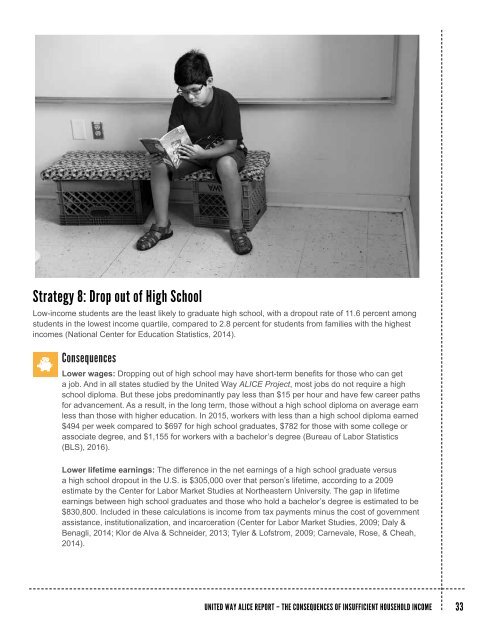The Consequences of Insufficient Household Income
This new Consequences of Insufficient Household Income report provides a deeper level of understanding of the choices that ALICE and poverty-level families across the country make when they do not have enough income or assistance to afford basic necessities, and the consequences of those choices.
This new Consequences of Insufficient Household Income report provides a deeper level of understanding of the choices that ALICE and poverty-level families across the country make when they do not have enough income or assistance to afford basic necessities, and the consequences of those choices.
Create successful ePaper yourself
Turn your PDF publications into a flip-book with our unique Google optimized e-Paper software.
Strategy 8: Drop out <strong>of</strong> High School<br />
Low-income students are the least likely to graduate high school, with a dropout rate <strong>of</strong> 11.6 percent among<br />
students in the lowest income quartile, compared to 2.8 percent for students from families with the highest<br />
incomes (National Center for Education Statistics, 2014).<br />
<strong>Consequences</strong><br />
Lower wages: Dropping out <strong>of</strong> high school may have short-term benefits for those who can get<br />
a job. And in all states studied by the United Way ALICE Project, most jobs do not require a high<br />
school diploma. But these jobs predominantly pay less than $15 per hour and have few career paths<br />
for advancement. As a result, in the long term, those without a high school diploma on average earn<br />
less than those with higher education. In 2015, workers with less than a high school diploma earned<br />
$494 per week compared to $697 for high school graduates, $782 for those with some college or<br />
associate degree, and $1,155 for workers with a bachelor’s degree (Bureau <strong>of</strong> Labor Statistics<br />
(BLS), 2016).<br />
Lower lifetime earnings: <strong>The</strong> difference in the net earnings <strong>of</strong> a high school graduate versus<br />
a high school dropout in the U.S. is $305,000 over that person’s lifetime, according to a 2009<br />
estimate by the Center for Labor Market Studies at Northeastern University. <strong>The</strong> gap in lifetime<br />
earnings between high school graduates and those who hold a bachelor’s degree is estimated to be<br />
$830,800. Included in these calculations is income from tax payments minus the cost <strong>of</strong> government<br />
assistance, institutionalization, and incarceration (Center for Labor Market Studies, 2009; Daly &<br />
Benagli, 2014; Klor de Alva & Schneider, 2013; Tyler & L<strong>of</strong>strom, 2009; Carnevale, Rose, & Cheah,<br />
2014).<br />
UNITED WAY ALICE REPORT – THE CONSEQUENCES OF INSUFFICIENT HOUSEHOLD INCOME<br />
33




